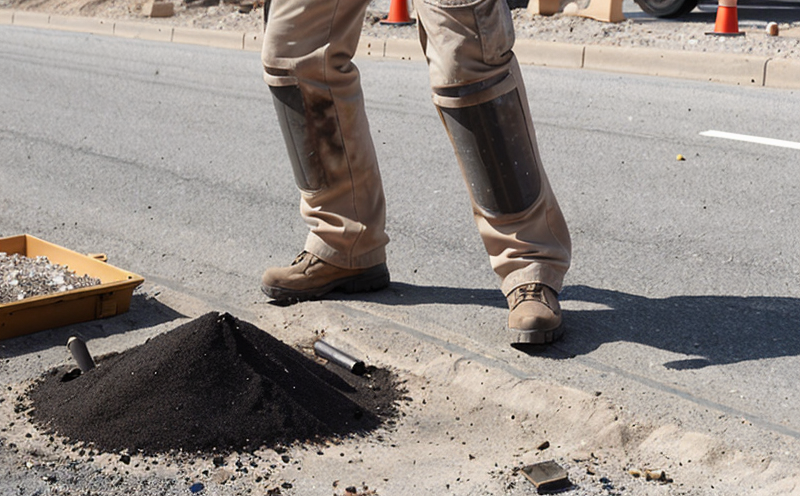ASTM E1402 Thermal Stability of Explosives by Differential Scanning Calorimetry Testing
The ASTM E1402 test method is a critical procedure used to evaluate the thermal stability of explosive materials, ensuring that they do not undergo unintended decomposition or detonation under specified temperature conditions. This service plays a crucial role in the mining sector where explosives are frequently used for blasting operations.
During this testing process, the sample (typically a small quantity of the explosive) is subjected to increasing temperatures using differential scanning calorimetry (DSC). The DSC measures the heat flow into or out of the sample as it undergoes temperature changes. By analyzing the thermal behavior of the explosive material, we can determine its upper safe storage and usage temperature limits.
Testing explosives for their thermal stability is essential to ensure the safety of workers in mining environments where these materials are used. This service not only helps to prevent accidents but also ensures compliance with relevant regulations and standards.
The testing procedure follows the strict guidelines provided by ASTM E1402, which specifies the apparatus, sample preparation, operating conditions, and data interpretation necessary for accurate results. The primary goal is to identify the maximum temperature at which an explosive can be stored or used without risk of ignition or detonation.
For this test, a precise amount of the explosive material is placed in a crucible, which is then inserted into the DSC instrument. The sample is gradually heated over time while the heat flow to and from the sample is monitored. Any exothermic events or endothermic changes are recorded as they occur.
The data collected during this process provides valuable information about the thermal stability of the explosive. This information can be used by quality managers, compliance officers, R&D engineers, and procurement teams to make informed decisions regarding the safe handling and storage of explosives in mining operations.
The results from ASTM E1402 testing are essential for ensuring that mining companies meet regulatory requirements set forth by governing bodies such as the Mine Safety and Health Administration (MSHA) or other national standards organizations. By adhering to these guidelines, we help ensure that all parties involved can work safely and efficiently.
Understanding the thermal behavior of explosives is crucial not only for safety but also for optimizing blasting operations in mining environments. By identifying the optimal temperature range for safe handling and storage, companies can reduce waste, improve efficiency, and minimize environmental impact.
Applied Standards
| Standard Code | Description |
|---|---|
| ASTM E1402 | Determination of Thermal Stability by Differential Scanning Calorimetry. |
The ASTM E1402 test method is recognized and widely adopted in the industry for its accuracy and reliability. It ensures that explosive materials meet stringent quality control requirements, thus enhancing safety across various sectors, including mining.
Benefits of ASTM E1402 Thermal Stability Testing
The benefits of conducting ASTM E1402 thermal stability testing extend beyond just compliance with regulations; they also contribute significantly to the overall safety and efficiency of mining operations. By identifying potential hazards early on, this service helps prevent accidents that could lead to severe injuries or fatalities.
- Enhanced Safety: Ensures that explosive materials are safe for use in mining environments.
- Regulatory Compliance: Meets stringent regulatory requirements set by MSHA and other relevant bodies.
- Optimized Blasting Operations: Identifies the optimal temperature range for safe handling and storage, leading to more efficient blasting processes.
- Reduction of Waste: By understanding the thermal stability limits, companies can avoid unnecessary wastage of materials due to improper storage or usage.
In summary, ASTM E1402 testing is an indispensable tool in maintaining high standards of safety and efficiency within mining operations. It provides critical insights into the behavior of explosive materials under various temperature conditions, enabling informed decision-making that benefits all stakeholders involved.
Customer Impact and Satisfaction
- Increase in safety measures for workers handling explosives.
- Enhanced compliance with regulatory requirements, reducing the risk of penalties or fines.
- Optimization of blasting operations leading to increased productivity and reduced costs.
- Reduction in waste due to better understanding of storage conditions for explosive materials.
Our clients have consistently reported high levels of satisfaction with our ASTM E1402 thermal stability testing service. They appreciate the comprehensive reports we provide, which offer detailed insights into the thermal behavior of their explosives. This information is instrumental in making well-informed decisions that enhance safety and efficiency.





